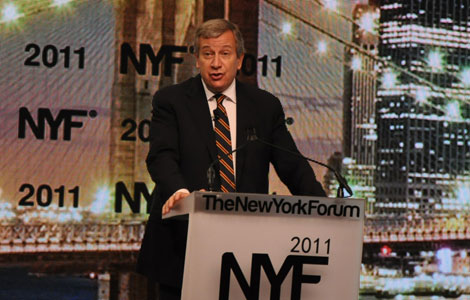Developing Eurasia cooperation
Updated: 2013-05-28 08:13
By Chen Xiangyang (China Daily)
|
|||||||||||
Premier Li Keqiang's first overseas trip since taking office - to India, Pakistan, Switzerland and Germany - was of strategic significance against the backdrop of the complex and profound changes taking place in the world and showed China's new leadership is forging ahead with its diplomatic strategy.
The persistent financial and debt crises in developed countries have led to a profound restructuring of the global power pattern, and the strategic game between established and emerging powers is becoming increasingly fierce. The United States, Europe and Japan have all been battered by their debt crises to varying degrees and their influence has declined. Meanwhile, emerging powers are collectively rising and have growing international influence.
In the face of this shift in the balance of power, developed countries are doing everything they can to retain their dominance. They have implemented loose monetary policies and trade protectionism against newly emerging economies in an attempt to undermine their export competitiveness, push up inflation and plunge them into stagflation. The US is also pushing forward the Trans-Pacific Partnership and a Transatlantic Trade and Investment Partnership with the European Union with which it hopes to revive its economic and political dominance.
So it is of particular importance for emerging powers to expand their economic, political, security and cultural cooperation in a comprehensive way. This is why Xi Jinping made Russia the destination for his first foreign visit as president and Li made India the first stop of his first official trip as premier. By visiting Russia, India and Pakistan and actively developing cooperation with these emerging markets, the new Chinese leadership is seeking to forge a Eurasian counterbalance to the two transoceanic partnerships.
Regardless of the growing crises in the Middle East and North Africa and its domestic fiscal situation, the US is determined to promote its Asia-Pacific rebalancing strategy. So China's surrounding environment is grim. Premier Li's visits to India and Pakistan reinforced friendly relations with South Asia, while President Xi's visit to Russia did the same, enabling China to focus attention on dealing with challenges from Northeast and Southeast Asia.
Premier Li's visits achieved remarkable results. After his visit to India, strategic mutual trust and pragmatic cooperation have been significantly strengthened. Li and Indian Prime Minister Manmohan Singh reached a broad consensus and agreed to further strengthen the China-India strategic cooperative partnership for peace and prosperity and to push for new achievements in bilateral cooperation, and the two countries are seeking common ground while reserving differences.
Related readings:
Li: China's development chances for the world
Li paves way for German investors
Li reiterates opposition to EU trade measures
Li's visit opens new chapter in China-Pakistan ties
Li's India visit attracts global attention
Today's Top News
Sudan threatens to stop S. Sudan's oil exports
Leaders oppose EU punitive tariffs, call for talks
President Xi calls for
'new' type of relations
Li paves way for German investors
Mutton found to contain duck meat
China investor in bid for Club Med
Migrant workers still avoid contracts
Officials told to give up VIP cards
Hot Topics
Lunar probe , China growth forecasts, Emission rules get tougher, China seen through 'colored lens', International board,
Editor's Picks

|

|

|

|

|

|





